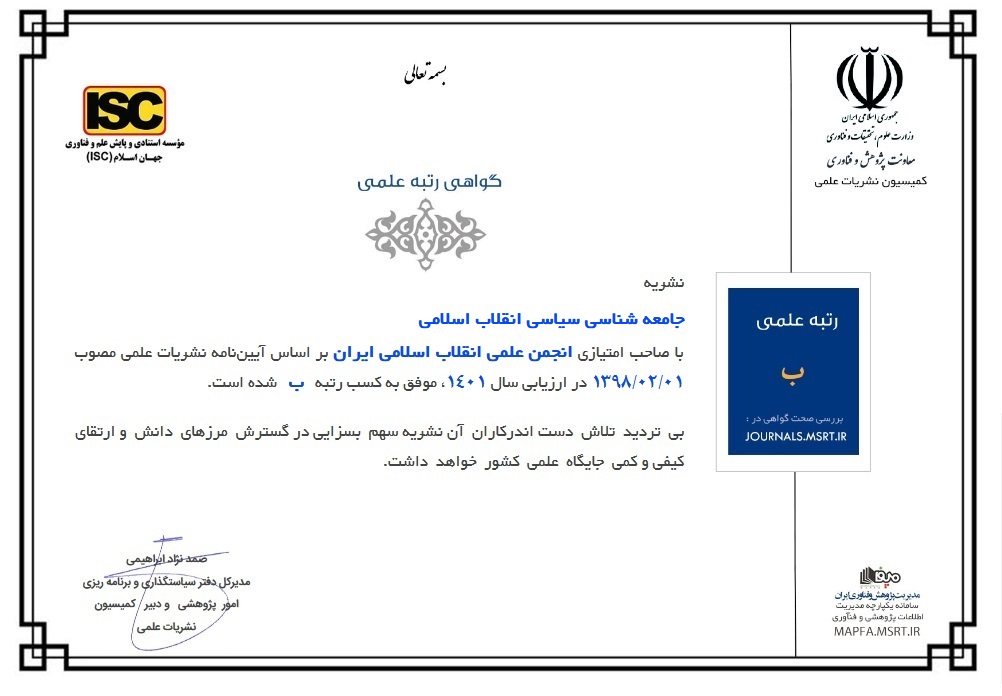نوع مقاله : مقاله پژوهشی
نویسندگان
1 دانشیار جغرافیای سیاسی، دانشگاه تهران، تهران، ایران
2 استادیار جغرافیای سیاسی، دانشگاه تهران، تهران، ایران
3 دانشجوی دکتری جغرافیای سیاسی، دانشگاه تهران، تهران، ایران
چکیده
در بحث از فعالیت گروههای تروریستی و شبهنظامی در ناحیهی بلوچستان که صبغهی کنشگری ژئوپلیتیک و گرایشات بنیادگرایانه (ضدشیعی) دارند، نقش دولتهای خارجی منطقهای و فرامنطقهای از اهمیت ویژهای برخوردار است؛ چون در فضای رقابتی یا خصمانه که پیرامون جمهوری اسلامی ایران در مقام یک قدرت منطقهای با تمایلات غربستیزانه و ایدئولوژیک شیعی وجود دارد، بیثبات جلوه دادن ایران و تهدید امنیت مرزهایش میتواند گامی در جهت تضعیف این کشور و تغییر احتمالی موازنهی قوا به نفع خودشان باشد. سئوال اصلی تحقیق حاضر این است: قدرتهای خارجی چه نقشی در کنشگری ژئوپلیتیکی گروههای تروریستی در بلوچستان دارند؟ فرضیهای که متعاقب این سئوال مطرح میشود: قدرتهای منطقهای و فرامنطقهای از موقعیت ژئوپلیتیک خاص بلوچستان بهرهبرداری کرده و با حمایتهای مستقیم و غیرمستقیمِ عمدتاً مالی، از تحرکات این گروهها برای بیثبات ساختن مرزهای ایران و ضربه زدن به منافع این کشور استفاده میکنند. نتایج تحقیق نشان میدهد که درهمتنیدگی مرزهای بلوچستان بین دو کشور ایران و پاکستان و همجواری آن با طالبان افغانستان، در کنار وضعیت اقتصادی نامطلوب و انزوای سیاسی و تبعیضات اجتماعی این ناحیه (که دارای اقلیت سنی است)، به قدرتهای خارجی اجازه داده تا اغراض و هدفهای خود را بهتر دنبال نمایند. روش تحقیق در مقالهی حاضر، گردآوری اسناد و منابع موجود تاریخی و غیرتاریخی به شیوهی کتابخانهای و سپس تحلیل دادههای به دستآمده است.
کلیدواژهها
عنوان مقاله [English]
Political Sociological Explanation of the Role of Foreign Powers in the Geopolitical Activism of Terrorist Groups (A Case Study of the Baluchistan Region of Iran)
نویسندگان [English]
- Rasoul Afzali 1
- Marjan Badei Aznadahi 2
- Hamidreza Alah Yaari 3
1 Associate Professor of Political Geography, University of Tehran
2 Assistant Professor of Political Geography, University of Tehran
3 Doctoral student of Political Geography, University of Tehran
چکیده [English]
In discussing the activity of terrorist and militia groups in Baluchistan region, which have the color of geopolitical activism and fundamentalist (anti-Shia) tendencies, the role of regional and extra-regional foreign governments is of special importance; because in the competitive or hostile atmosphere that exists around the Islamic Republic of Iran as a regional power with anti-Western and Shiite ideological tendencies, making Iran appear unstable and endangering the security of its borders can be a step towards weakening this country and the possible change of the balance of power in their favor. The main question of the current research is: What role do foreign powers play in the geopolitical activism of terrorist groups in Baluchistan? The hypothesis that is raised following this question: Regional and extra-regional powers have taken advantage of the special geopolitical situation of Baluchistan and with direct and indirect support, mainly financial, they use the movements of these groups to destabilize Iran's borders and attack the country's interests. The results of the research show that the entanglement of Baluchistan's borders between the two countries of Iran and Pakistan and its proximity to the Afghan Taliban, along with the unfavorable economic situation and political isolation and social discrimination of this area (which has a Sunni minority), have given power foreign countries have allowed them to pursue their goals and objectives better. The research method in this article is to collect historical and non-historical documents and sources in a library manner and then analyze the obtained data.
کلیدواژهها [English]
- Islamic Republic of Iran
- Baluchistan
- terrorism
- foreign powers
- security

